|
Rugby World Cup 2015
IRB boss defends World Cup schedule
Graham Jenkins at Twickenham
May 2, 2013

IRB chief executive Brett Gosper insists the match schedule for the 2015 World Cup is the fairest in the tournament's mhistory.
© Getty Images
Enlarge
International Rugby Board chief executive Brett Gosper is adamant the match schedule for the 2015 World Cup is the fairest in the history of the tournament.
The 2015 World Cup grounds
Organisers were the subject of widespread criticism during the 2011 World Cup for a fixture list that gave the world's best sides a week between pool games, reportedly in order to satisfy the demands of TV chiefs who wanted top-tier nations to play at weekends and therefore attract the highest possible viewing figures. In contrast, minnows were forced to condense their pool campaigns with Russia having to play their four pool games - against Australia, Ireland, Italy and the USA - in the space of just 16 days while Namibia were afforded a similar length of time to negotiate clashes against South Africa, Wales, Samoa and Fiji. The same schedule demanded Samoa took on Wales in a crunch clash just four days after their opener against Namibia and take on South Africa five days following their fixture against Fiji. That outcry led to a series of meetings between all the Unions that laid the foundation for the 'balanced' schedule for the sport's next showpiece announced at Twickenham earlier today. "This is the most balanced and equitable match schedule in the history of the Rugby World Cup," said Gosper, "and we are grateful to the participating nations for helping us organise that. "There is a lot of good sense and logic in the decisions behind match schedule," added Gosper who insisted the fears of the likes Samoa and Tonga of a repeat of 2011 had been allayed. "Yes, and they are very happy about it too. All the Unions had to participate in achieving that balance and it will lead to a more competitive World Cup and we are also very pleased about that." Hosts England are afforded the greatest leeway in the schedule with eight days between their opener and second game with Stuart Lancaster's side handed a week's rest ahead of their final two clashes. But Gosper explained the overall balance was fair for all competing nations. "There are only five occasions for Tier 1 nations and five occasions for Tier 2 nations where the rest period is as small as three," he said. "Generally across the schedule you have a balanced rest day programme and that has been an issue in the past because we have seen performances fall off at the end of the pool stage for the Tier 2 teams as they don't have the depth or the rest days the Tier 1 nations have. The Tier 1 nations have been terrific because they have worked very hard to help us get to that." Only one Tier 1 nations had a three day turnaround at the last World Cup with the latest schedule illustrating that Tier 2 nations will have a longer rest period before they take on one of the world's top side. For example, Samoa kick off their campaign against a qualifier from the Americas on September 20 and will then have six days to prepare for their game against South Africa. They will then have seven days to re-group for their next game against a qualifier from Asia and then five more days before their meeting against Scotland. Similarly, Tonga will have five days to prepare for their games against both Argentina and New Zealand. Gosper denied that pressure from host broadcasters ITV influenced the timing of England's matches but admitted commerical factors had to be taken into consideration. "There are of course commercial realities and we want these games to be on at times when they will attract a big audience for the game itself and all of that is taken into consideration," he said, "but there is no specific pushing or shoving by anyone." The IRB are also confident that they have addressed the player release issue that blighted the 2011 tournament. Some players were reportedly prevented from accepting an international call up in contravention of IRB Regulation 9. "We have put in place a series of annual meetings to monitor this and make sure no one is defing Regulation 9," insisted Gosper. © ESPN Sports Media Ltd. Graham Jenkins is the Senior Editor of ESPNscrum and you can also follow him on Twitter.
|
Live Sports
Communication error please reload the page.
-
Football
-
Cricket
-
Rugby
-
- Days
- Hrs
- Mins
- Secs
F1 - Abu Dhabi GP
Abu Dhabi Grand Prix December 11-131. Max Verstappen ()
2. Valtteri Bottas (Mercedes)
3. Lewis Hamilton (Mercedes)
4. Alexander Albon ()
5. Lando Norris ()
6. Carlos Sainz Jr ()
-
ESPNOtherLive >>
Darts - Premier League
Golf - Houston Open
Snooker - China Open
Tennis - Miami Open

